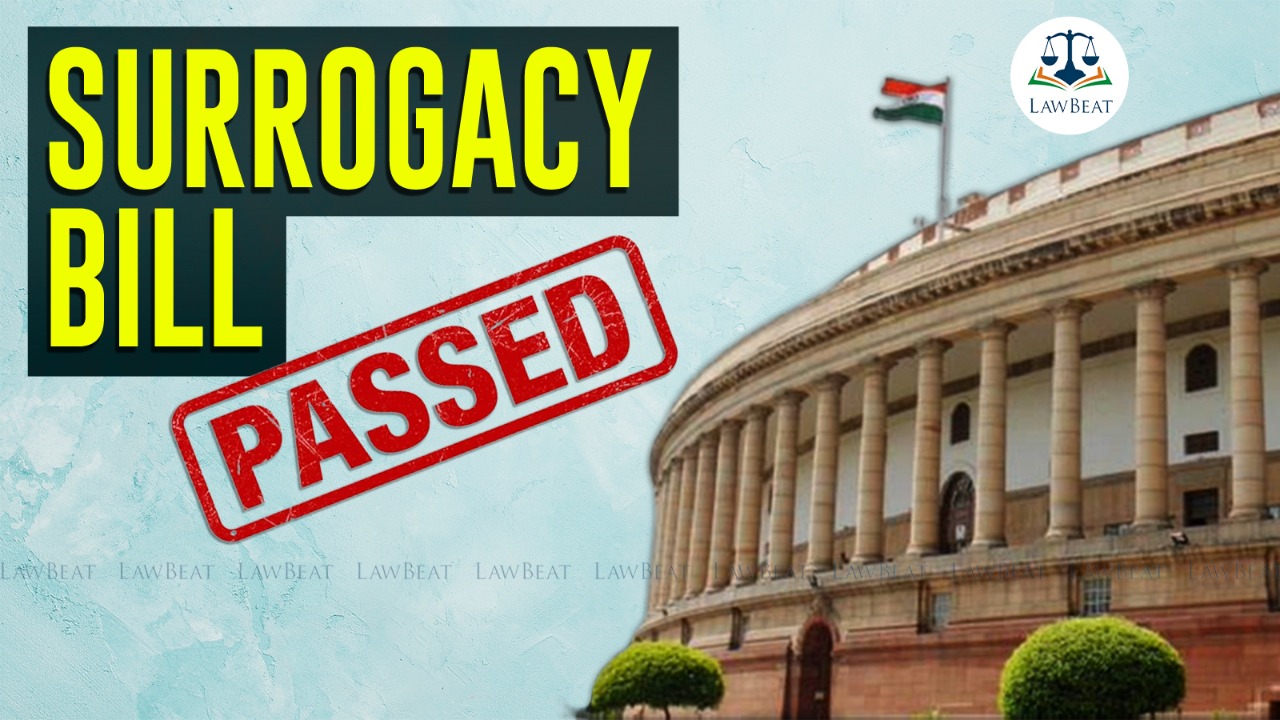Only Indian couples married for five years allowed to opt for surrogacy: Parliament passes Surrogacy Regulation Bill, 2019

On Friday, Parliament passed the Surrogacy (Regulation) Bill, 2019 on Friday, with Lok Sabha passing it with voice vote. Rajya Sabha passed the bill after amendments, and returned it to Lok Sabha on December 14.
The 228th report of the Law Commission had recommended that the government should enact a legislation to ensure that there is only restrictive surrogacy in the country and commercial surrogacy is banned. The bill was first introduced in Lok Sabha in July 2019 and passed in Lok Sabha in August 2019. The Select Committee submitted its report in February 2020, following which the Rajya Sabha passed it in December 2021.
According to the Statement of Objects and Reasons of the bill, only Indian couples who have been legally married for at least five years will be allowed to opt for surrogacy. The bill aims to constitute a National Surrogacy Board and state surrogacy boards, and appoint appropriate authorities for regulation of the practice and process of surrogacy. Some of the salient features are:
- Purposes for which surrogacy is permitted: Surrogacy is permitted when it is: (i) for intending couples who suffer from proven infertility; (ii) altruistic; (iii) not for commercial purposes; (iv) not for producing children for sale, prostitution or other forms of exploitation; and (v) for any condition or disease specified through regulations.
- Eligibility criteria for intending couple: The intending couple should have a ‘certificate of essentiality’ and a ‘certificate of eligibility’ issued by the appropriate authority.
- A certificate of essentiality will be issued upon fulfilment of the following conditions: (i) a certificate of proven infertility of one or both members of the intending couple from a District Medical Board; (ii) an order of parentage and custody of the surrogate child passed by a Magistrate’s court; and (iii) insurance coverage for a period of 16 months covering postpartum delivery complications for the surrogate.
- The certificate of eligibility to the intending couple is issued upon fulfilment of the following conditions: (i) the couple being Indian citizens and married for at least five years; (ii) between 23 to 50 years old (wife) and 26 to 55 years old (husband); (iii) they do not have any surviving child (biological, adopted or surrogate); this would not include a child who is mentally or physically challenged or suffers from life threatening disorder or fatal illness; and (iv) other conditions that may be specified by regulations.
- Eligibility criteria for surrogate mother: To obtain a certificate of eligibility from the appropriate authority, the surrogate mother has to be: (i) a close relative of the intending couple; (ii) a married woman having a child of her own; (iii) 25 to 35 years old; (iv) a surrogate only once in her lifetime; and (v) possess a certificate of medical and psychological fitness for surrogacy. Further, the surrogate mother cannot provide her own gametes for surrogacy.
- Appropriate authority: The central and state governments shall appoint one or more appropriate authorities within 90 days of the Bill becoming an Act. The functions of the appropriate authority include; (i) granting, suspending or cancelling registration of surrogacy clinics; (ii) enforcing standards for surrogacy clinics; (iii) investigating and taking action against breach of the provisions of the Bill; (iv) recommending modifications to the rules and regulations.
- Registration of surrogacy clinics: Surrogacy clinics cannot undertake surrogacy related procedures unless they are registered by the appropriate authority. Clinics must apply for registration within a period of 60 days from the date of appointment of the appropriate authority.
The bill further states that undertaking or advertising commercial surrogacy is an offence. Further exploiting the surrogate mother or abandoning, exploiting or disowning a surrogate child have also been listed as offences. The penalty for such offences is imprisonment up to 10 years and a fine up to 10 lakh rupees.
